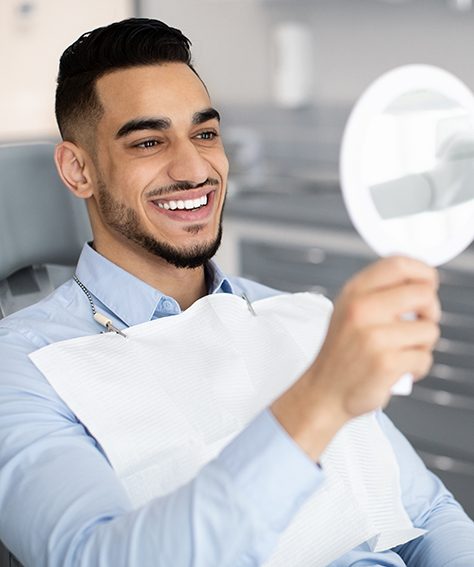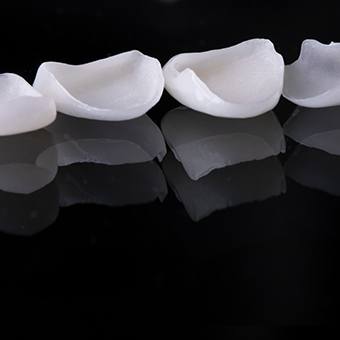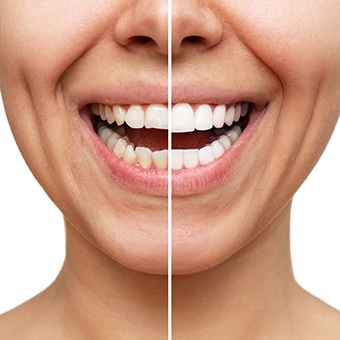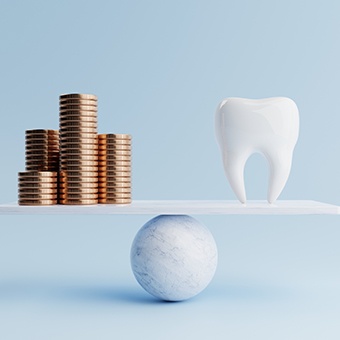
Veneers – Austin, TX
Cover Imperfections for a Flawless Smile

Although seemingly everyone wishes they had a picture-perfect grin, very few people are born with perfect teeth. If you’re self-conscious about aesthetic dental issues, you might become anxious about how others will perceive your appearance. You might even try to remain tight-lipped to avoid smiling or speaking with someone when you’re concerned they might judge you.
Fortunately, Dr. Ifraitekh can use veneers to cover imperfections for a flawless smile meant to last. Continue reading to learn more about this popular cosmetic treatment, and feel free to contact us for more information.
Why Choose Snow Dental for Veneers?
- Advanced Technology to Increase Patient Comfort
- Lifelike, Tooth-Colored Materials
- Insurance Accepted & Flexible Financing Available
What are Dental Veneers?

Veneers are thin shells made of durable ceramic that are customized to match the size, shape, and shade of your natural teeth. Then, they’re bonded to their front surface to mask unsightly flaws. They’re coated with a glaze resilient enough to resist chipping and stains and can even shield the underlying teeth from harm. On top of that, they’re known to last 15+ years if they’re cared for correctly.
Dr. Ifraitekh can use this versatile solution to address one or several issues simultaneously, such as:
- Chips or cracks.
- Stubborn stains.
- Minor gaps.
- Slight overcrowding.
- Somewhat misshapen teeth.
The Process of Getting Veneers

Potentially anyone who is not 100% satisfied with their grin’s appearance could benefit from veneers. However, that doesn’t mean they’re the best treatment for everyone’s unique situation. Before you can proceed, you must schedule a consultation with Dr. Ifraitekh so he can verify that you’re a viable candidate. He’ll examine your mouth to ensure no issues like cavities or gum disease might interfere with your results and make a decision based on his findings.
If you’re approved to move forward, our team prepares your teeth by removing a thin layer of enamel. This ensures that your veneers align flush against your gums, but this protective outer layer doesn’t regenerate. Then, our team will make impressions of your teeth to send to a lab to begin creating your prosthetics. Because they are somewhat vulnerable after this preparation, we’ll likely provide a temporary set of veneers for you to wear in the meantime.
The Benefits of Veneers

There are many advantages of getting veneers in Austin, including:
- Damage resistant. The porcelain of your veneers is less porous than your natural teeth, so they can’t get cavities and resist minor breaks and discoloration.
- Long-lasting. These prosthetics can last for decades if they’re cared for properly.
- Easy maintenance. All you have to do is brush and floss twice daily and schedule a routine dental checkup every six months to keep your restorations in excellent condition.
- Boost confidence. They’re made to match your natural teeth for a seamless smile that’s sure to leave you looking and feeling your best.
- These shells can be used to address several different imperfections that can detract from your appearance all at one time.
Understanding the Cost of Veneers

Veneers are considered a cosmetic procedure intended to enhance your looks more than your dental health, so most insurance policies don’t cover the cost. As a result, many patients want to know how expensive they are before beginning the process.
The price can vary from person to person based on their unique circumstances. Once you’ve had your consultation, our team can give you a more detailed estimate and walk you through the information. Rest assured, we won’t begin any procedure without ensuring you understand the expenses involved and have given the green light to move forward.
We don’t want your budget to hold you back from having the flawless grin you deserve, so we’ve partnered with CareCredit to offer flexible financing. If your application is approved, you can break down your final invoice into more manageable installments.
Veneer FAQs
Can Veneers Be Used for Bite Corrections?
Veneers can be used for minor bite corrections, but they are not a solution for significant bite issues like severe overbites, underbites, or crossbites. Veneers focus on aesthetics rather than addressing the underlying functional issues of the bite. In cases of minor bite problems, veneers can help improve the alignment of front teeth, giving the appearance of a more even bite.
However, for more substantial bite corrections, treatments like braces, clear aligners, or orthodontic work are typically required. We’ll be able to talk to you more about what veneers could do for you when we meet you in person.
Do Veneers Feel Like Real Teeth?
Yes, veneers generally feel very similar to real teeth once they're properly placed. Since veneers are thin shells that bond to the front surface of your natural teeth, they don't significantly change the way your teeth feel inside your mouth. The material used for veneers, typically porcelain, is designed to mimic the texture and smoothness of natural enamel, so they should feel comfortable when speaking, chewing, or running your tongue over them. However, there might be a short adjustment period after placement as you get used to them. A well-done veneer should feel natural and blend seamlessly with your existing teeth.
How are Veneers Different Than Crowns?
Veneers and crowns serve different purposes and cover different parts of the tooth. Veneers are thin shells that are bonded to the front surface of teeth, primarily for cosmetic improvements like correcting the shape, size, or color of visible teeth. They are less invasive since only a small portion of the tooth’s front surface is shaved down to fit the veneer. Veneers are ideal for people looking to improve the appearance of their smile.
Crowns, on the other hand, cover the entire tooth, not just the front. They are used when a tooth is severely damaged, decayed, or has undergone a root canal, providing both protection and restoration. Crowns require more enamel reduction and are stronger than veneers, offering both functional and cosmetic benefits.
Is It Painful to Get Veneers?
Getting veneers is typically not painful. During the procedure, the dentist removes a small layer of enamel from the tooth’s surface to make room for the veneer. This step may cause mild discomfort, but a local anesthetic is usually applied to numb the area, ensuring you don’t feel pain. After the enamel is removed and impressions are taken, temporary veneers may be placed, which could cause slight sensitivity until the permanent veneers are ready.
Once the permanent veneers are bonded, some people experience minor sensitivity to hot or cold, but this usually subsides after a few days. Overall, the process is generally comfortable, with minimal discomfort.